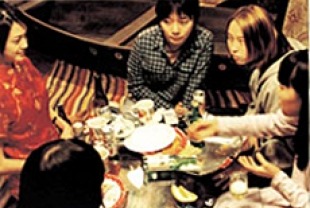"Friendships should begin slowly, on neutral ground, and, if they are so destined, work their way into deeper waters," Molly Haskell writes in Love and Other Infectious Diseases. In her striking debut as a feature film director Jae-eun Jeong has fashioned a multidimensional drama about the evolving friendship between five female high school friends in the port city of Incheon, Korea. They have high hopes of staying close but the harsh realities of work, family, and the pressures to find their way in the world get in the way. Nonetheless, they manage to keep in touch as best they can.
Hae-joo (Yo-won Lee) is the luckiest of the lot since she lands a job as an assistant in a brokerage firm. Quite proud of herself, she is constantly trying to improve her appearance. She has laser surgery on her eyes and is the fashion maven in the group. All five friends gather to celebrate her twentieth birthday. When she moves from Incheon to an apartment in Seoul, the gap between her and the other four widens.
Tae-hee (Doo-na Bae) is the switchboard for the group, trying valiantly to arrange meetings and reaching out to those who are going their own way. She works for her father for free and feels like a second-class citizen in a family that gives all praise to her brothers. In her spare time, Tae-hee types for a writer afflicted with cerebral palsy who has a crush on her. In a poem he declares, "I feel stuck to the floor like a piece of gum."
That perfectly describes the state of being that Ji-young (Ji-young Ok) finds herself in while living with her grandparents in a rundown house in shantytown. She has dreams of studying textiles abroad but has no job. She takes in a stray kitten and gives it to Hae-joo for her birthday. But when she moves to Seoul, she passes it on to Tae-hee. It eventually winds up with the Chinese twins, Bi-ryu (Eun-shil Lee) and Ohn-jo (Eun-joo Lee), who sell trinkets on the streets of Incheon and are quite happy with their carefree existence. The fact that none of these women is able to give this cat the love and nurturing it needs points to something essential that is missing in their wayward lives. Tae-hee is the only woman in the group who seems capable of taking friendship into deeper waters. She is there when Ji-young gets into trouble and is willing to do whatever it takes to help her out.
One of the most interesting dimensions of the film is the major role given to cell phones in the characters' lives. They are constantly turning to them, even when they are in each other's presence. The writer and director Jae-eun Jeong puts the text messages on the screen and shows how these friends use the phones for musical accompaniment when they need a backdrop for something they are doing. This rich study of female friendship has universal elements to it that will appeal to a broad audience.
